Archives
-
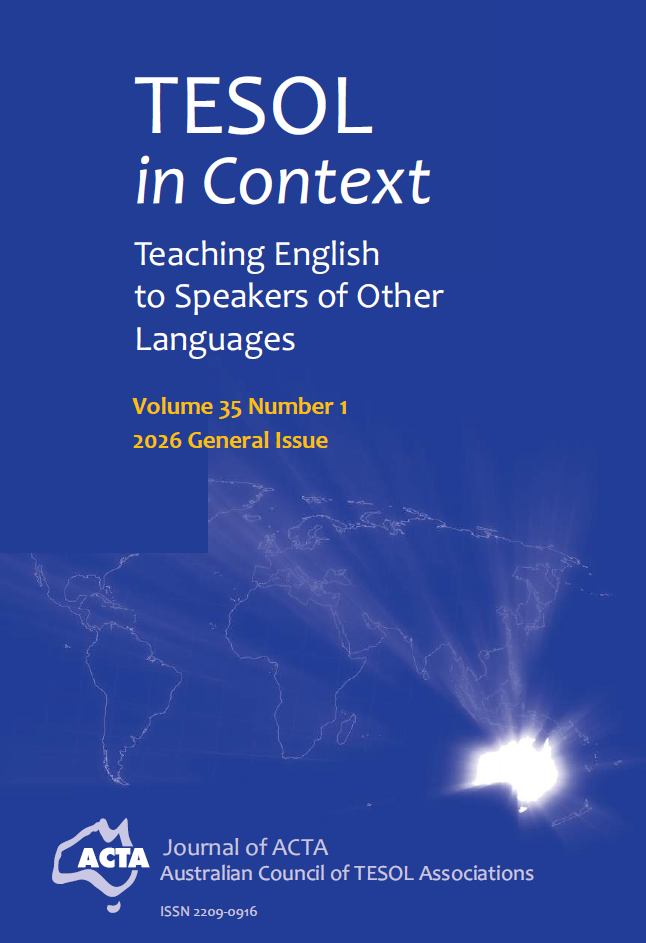
General Issue [Pre-published]
Vol. 35 No. 1 (2026)Happy New Year everyone!
We are pre-publishing articles for the first general issue of 2026 - Vol 35 No 1. More are coming up.
-
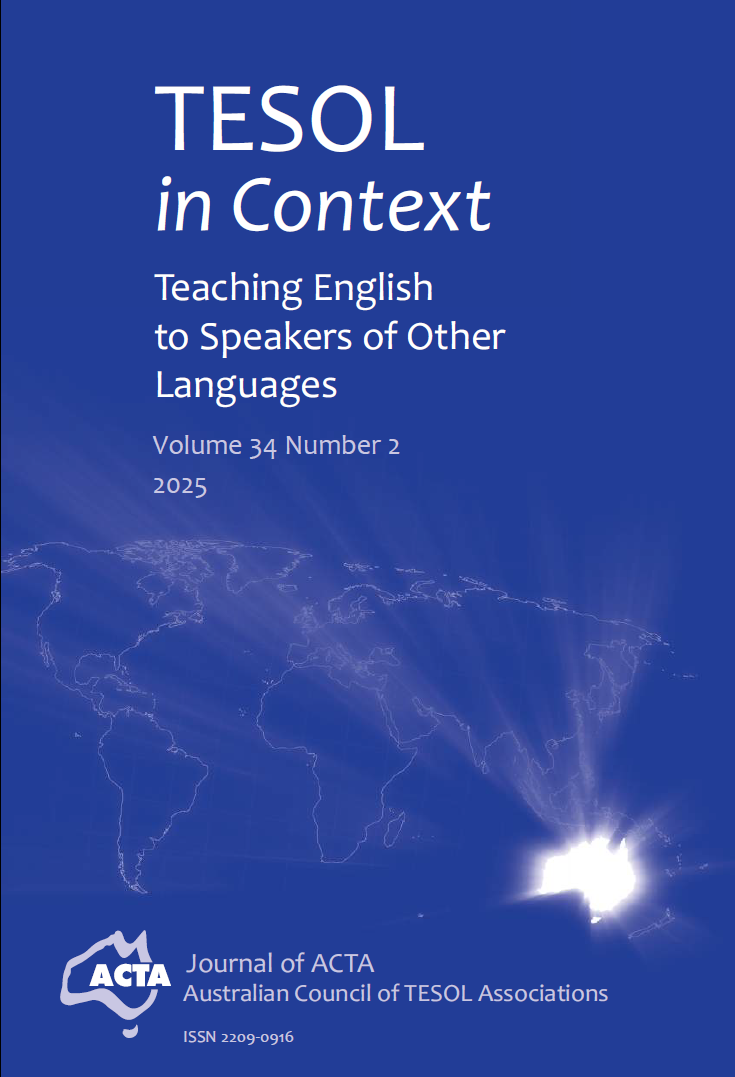
General Issue
Vol. 34 No. 2 (2025)This general issue 2025 Volume 34 Number 02 focuses on a broader range of topics related to TESOL and/or EAL/D in Australia and around the world. The Editors are Dr Shashi Nallaya (University of South Australia), Dr Julie Choi (University of Melbourne), Dr Sue Ollerhead (The University of South Pacific), and Dr Fiona Xiaofei Tang (Kaplan Business School / Kaplan Australia).
We would like to thank all contributors, reviewers, and the broader TESOL in Context community.
Most importantly, wishing you all a very joyful festive season, and looking forward to seeing you in 2026!

-
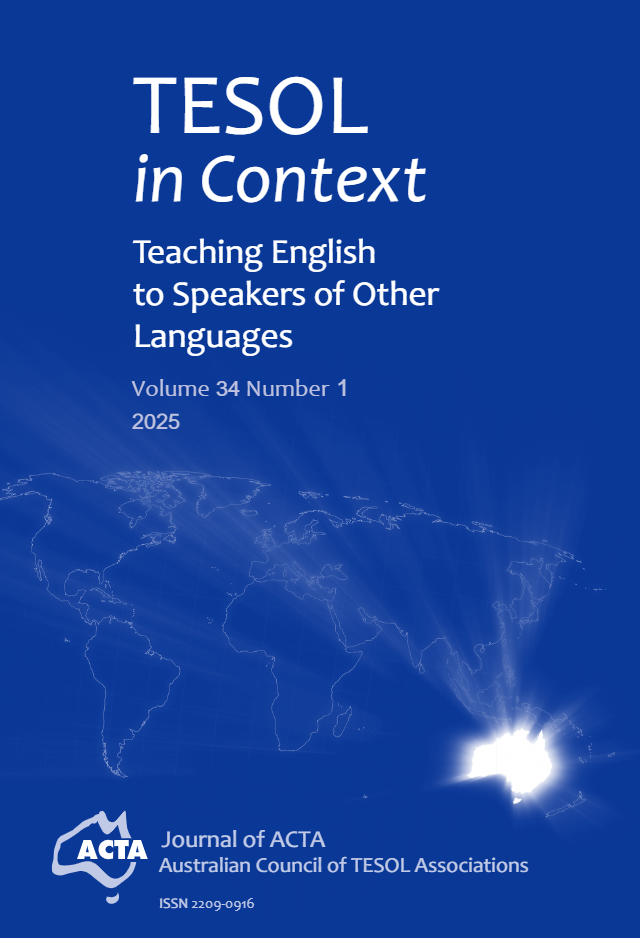
General Issue
Vol. 34 No. 1 (2025)This general issue 2025 Volume 34 Number 01 focuses on a broader range of topics related to TESOL and/or EAL/D in Australia and around the world. The Editors are Dr Ward Peeters (Monash University), Dr David Wei Dai (University College London), Dr Sal Consoli (University of Edinburgh), and Dr Fiona Xiaofei Tang (Kaplan Business School / Kaplan Australia).
-
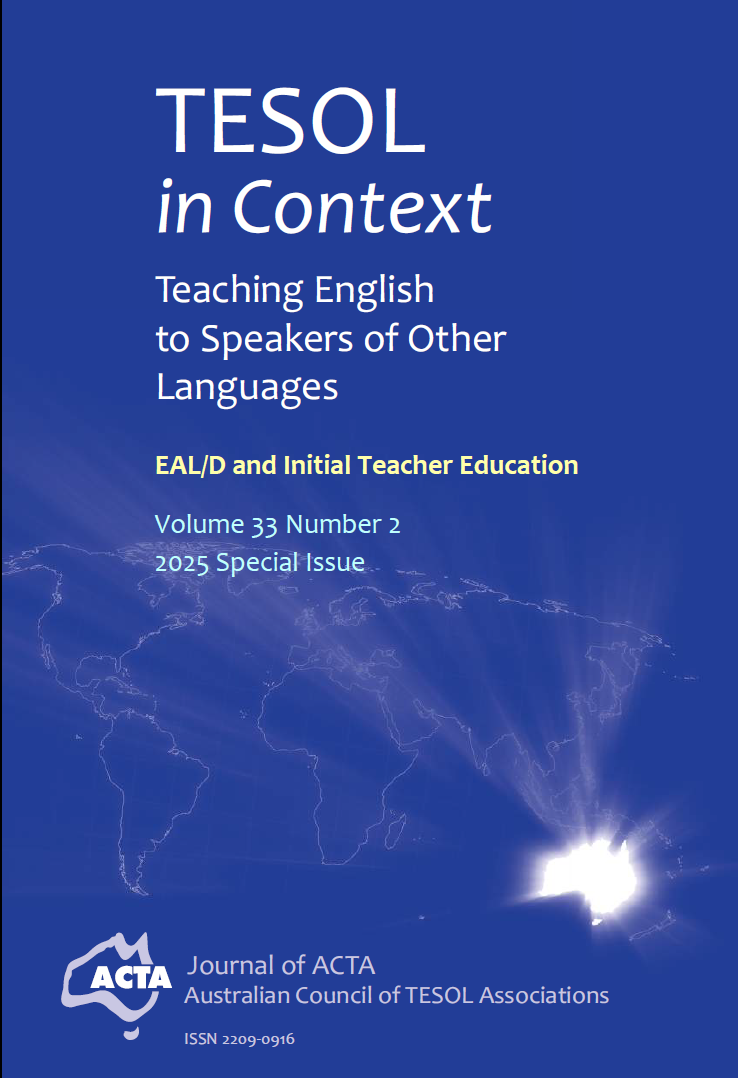
EAL/D and Initial Teacher Education
Vol. 33 No. 2 (2025)This edition 2025 Volume 33 Number 02 focuses on a special theme - Initial Teacher Education (ITE) and schooling for multilingual learners. Guest Editors are Dr Mei French (University of South Australia) and Associate Professor Julie Choi (The University of Melbourne).
Special thanks go to our editorial team - Academic Copyeditors, Dr Daniel W. J. Anson and Dr Fatemeh Ranjbaran Madiseh, and Managing Editor, Dr Fiona Xiaofei Tang.
-
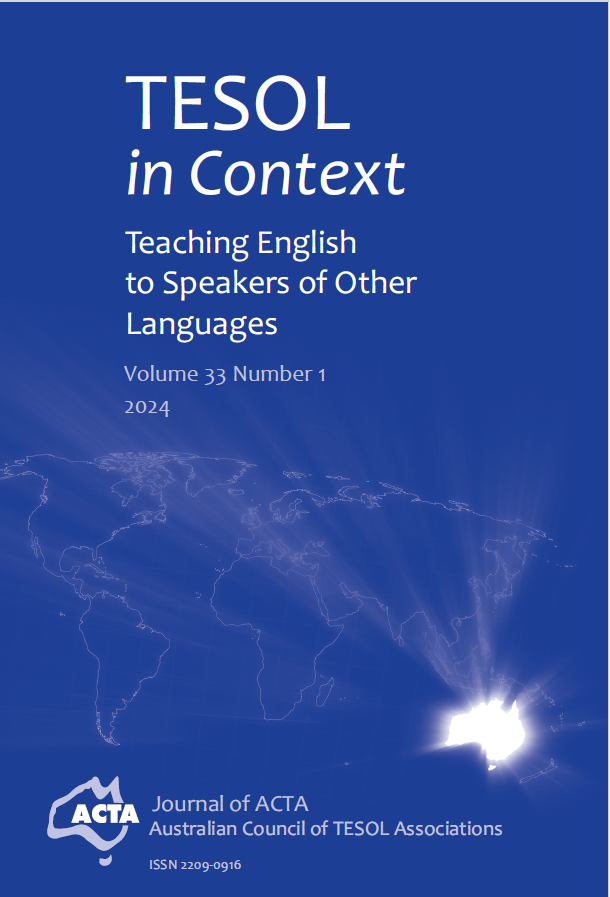
General Issue
Vol. 33 No. 1 (2024)This is the second general issue for 2024 - TESOL in Context 2024 Volume 33 Number 01 General Issue. We would like to thank the Editors Dr Shashi Nallaya, Dr Sue Ollerhead, and Associate Professor Julie Choi, the Guest Editor Associate Professor Rod Neilsen, the Copyeditors Dr Daniel W. J. Anson and Dr Fatemeh Ranjbaran Madiseh, and the Journal Coordinator Dr Fiona Tang for their tireless efforts in bringing this issue to completion.
-
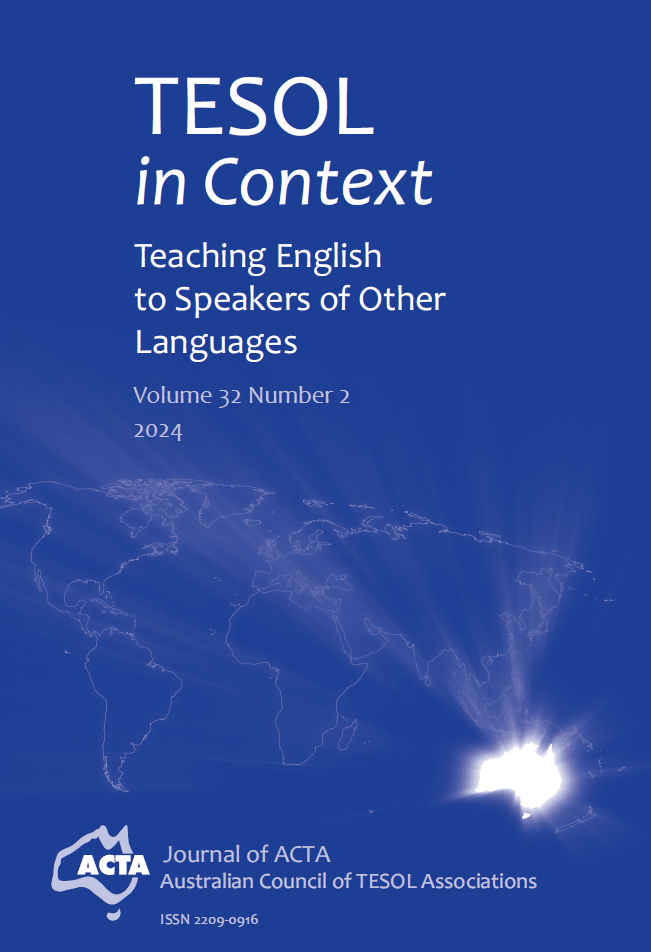
General Issue
Vol. 32 No. 2 (2024)This issue of TESOL in Context contains two articles and two book reviews that illustrate the breadth of the field and scope of the journal. We hope each member of the diverse TESOL in Context readership will find material in this volume that assists in classroom practices or invites higher level reflection of professional identity and the role TESOL practitioners play in ensuring inclusive practices and social cohesion in an increasingly globalised world.
The editors of this issue, Dr Averil Grieve, Dr Sharon Yahalom, and Dr David Wei Dai would like to express their sincere gratitude to the authors, reviewers, editorial board members, the preceding journal coordinator Skye Playsted, and the current journal coordinator Dr Fiona Tang for their efforts, expertise, and dedication in bringing this issue to completion through a challenging period.
-
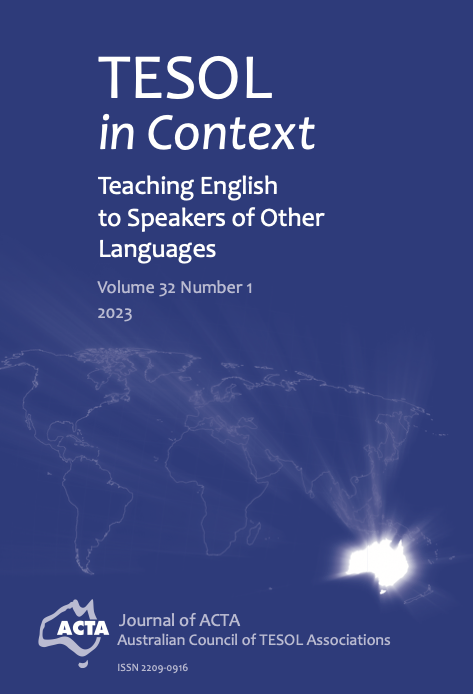
Teaching English Language Learners Across the Curriculum
Vol. 32 No. 1 (2023)This Special Issue has two primary goals. Firstly, we aimed to bring together diverse perspectives and voices from across Australia that showcase the remarkable efforts that teachers and educators are already doing to cater for the needs of EAL/D learners in schools and mainstream environments. Secondly, and while acknowledging these commendable efforts by educators, we argue that more work is needed to address the persistent challenges in providing tailored support that addresses the diverse linguistic and cultural backgrounds of EAL/D students. We acknowledge that catering for EAL/D learners’ needs in schools and mainstream classes involves more than just structural adjustments. It necessitates a paradigm shift in educational perspectives. Beyond the accommodation of linguistic diversity, there is a crucial need to challenge and disrupt dominant deficit views that may prevail in educational settings. The insights gathered from these articles illuminate the multifaceted and dynamic landscape of EAL/D education in Australia. They collectively underscore the necessity for an integrated approach that encompasses not only specialized pedagogies but also a deep understanding of the cultural and linguistic diversity present in our classrooms.
-

Digital technology in language teaching and learning
Vol. 31 No. 2 (2023)The prevalence of technology in all aspects of life over the past few decades has dictated that schools prepare and equip students to live and work in a world where information is produced and disseminated rapidly. Schools have a further responsibility to train students to acquire critical digital literacy so that they can consciously and responsibly use technology not only for learning but also in all other spheres of their lives. This responsibility was further accentuated when the COVID- 19 pandemic significantly changed the role of instructional technology in schools. Homes became classrooms and teachers had to find innovative ways to impart knowledge and engage learners, especially in language teaching and learning classrooms. It is then very appropriate that TESOL in Context has dedicated this special issue to the ways in which technology is being used across a variety of classroom contexts, ranging from school to university and adult literacy settings. This special issue comprises five research articles and three book reviews expounding on how teachers, guided by particular pedagogical principles, have chosen and employed different technological tools in their language teaching to inspire student learning.
The editors of this special issue, Dr Shashi Nallaya, Dr Julie Choi and Dr Sue Ollerhead would like to express their immense gratitude to the reviewers, editorial board members and journal coordinator Skye Playsted for their time, expertise and dedication in bringing this issue to fruition.
-

Vol. 31 No. 1 (2022)
This issue of TESOL in Context contains four articles that complement each other in their focus and arguments concerning political ideologies, the commodification of English as an additional language/dialect (EAL/D) teaching and the professional training needs of both EAL/D and mainstream teachers in Australian education. The first two submissions are discussion papers, which set the scene for two articles reporting on results from empirical TESOL research. Four book reviews complete the volume with a focus on the work of EAL/D teachers and learners in a variety of contexts.
The articles and book reviews in this issue highlight important issues in EAL/D policy, research and practice, with a particular emphasis on the imperative to prioritise teacher preparation and professional learning. Underpinning all submissions is a clear understanding of the need for authenticity, collaboration, specialisation and utilisation of all of the linguistic competencies EAL/D bring with them to classrooms. This has implications for TESOL within and beyond Australian borders and highlights the need for continued dialogue with government and funding bodies to ensure the teaching and learning of EAL/D students is comprehensively supported in a wide range of educational contexts.
-

Interactional competence in the online space: Affordances, challenges and opportunities for TESOL practitioners
Vol. 30 No. 2 (2022)Interactional competence (IC) is a concept gaining growing currency in language learning, teaching and assessment. First proposed by Kramsch (1986), IC focuses on developing second language (L2) speakers’ abilities to use language for functional purposes, ranging from “survival as a tourist or a student to negotiating treaties” (p. 366). The conceptualization of language competence as an ability for use differentiates IC from traditional understanding of proficiency, which consists of componential, de-contextualized ability indicators such as lexical range, grammatical soundness, and pronunciation. The ethos of IC emphasizes that language teaching education needs to focus on cultivating L2 speakers’ abilities to use their linguistic resources (e.g., vocabulary and grammar) to achieve meaningful social actions in real-world interactional contexts. This special issue comprises three research articles and three book reviews, each of which exemplifies the ways in which IC can be applied to face-to-face and online learning opportunities for L2 speakers.
The editors of this special issue, Dr David Wei Dai, Dr Averil Grieve and Dr Sharon Yahalom would like to express a big thank-you to the reviewers, editorial board members and journal coordinator for contributing their time and expertise in the preparation of this issue.








